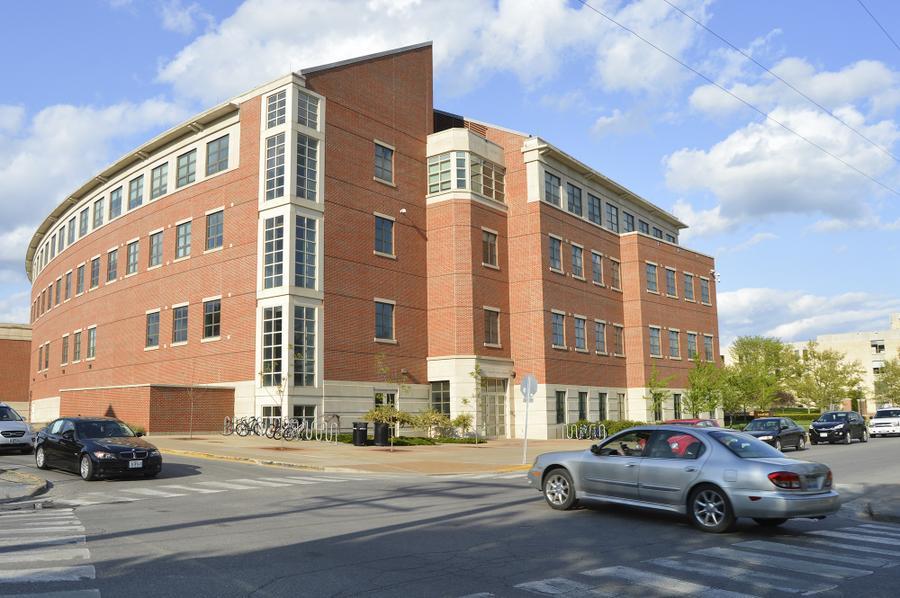MU administrators and Missouri legislators gathered on campus April 13 to break ground on Lafferre Hall, the first state-funded capital project on MU’s campus in 12 years.
Lafferre Hall [has been in need of renovation for a long time](https://www.themaneater.com/stories/2014/10/22/lafferre-renovation-start-early-2015/), but the new project is not a product of the 50-50 fund match program, the UM System’s effort to match private donations with state funding to fund construction projects across the four campuses. Rather, it was funded as a maintenance and repair from the bonds authorized in 2014, Marty Oetting, the UM System’s director of government relations, said in an email.
As the UM System’s chief lobbyist, Oetting plays a major role in ensuring lawmakers recognize the value of private donations and the potential opportunities they could provide for the state. Legislators passed four projects last year and apparently see the value in the 50-50 program, Oetting said. He said the question that remains is: “Will there be funds available this year to dedicate to the projects?”
Gov. Jay Nixon decided to withhold the matching funds and put a hold on all four projects, including one for the Trulaske College of Business’ Applied Learning Center, due to limited tax revenue.
MU came forward with funding requests for four projects last year: Lafferre Hall, a teaching and research winery, [a fine arts and music building](https://www.themaneater.com/stories/2015/4/11/former-dfa-execs-make-record-breaking-donation-mus/) and the Applied Learning Center for the Trulaske College of Business. The Applied Learning Center was the only project to be greenlit by the legislators.
The Center is currently slated to be built on the southeast corner of Tiger Avenue and Rollins Street, across the street from Cornell Hall. Vice Chancellor for Advancement Tom Hiles said legislators approved $10 million of the $22 million MU submitted last year to fund the construction of the center.
College of Business Dean Joan Gabel said the center will provide space for “facilitated, experiential learning and research,” including areas dedicated to the practice of entrepreneurship, real-time trading and marketing.
But Nixon has put a hold on the center’s funding, just like he has for other projects approved by legislators since 50-50 was created in 2013.
Thus far, MU raised approximately $35 million in donor gifts for capital projects through the 50-50 program. Hiles said he is working to encourage the state to match that private funding.
“A lot of private dollars are coming from out of the state,” he said. “It only enhances the economic development opportunities in the state. Why would you leave any private dollars on the table?”
Nixon’s decision to withhold funds from legislature-approved capital projects is symptomatic of the state’s meager tax revenue, Hiles said. The governor’s office sets a bar for expected tax revenue in a fiscal year and when reported numbers fall short, the governor has to make cuts. These cuts often first strike capital projects.
“It is a challenge in a low-tax state like Missouri that is moving toward reducing the size of government and the amount of funding it collects from taxpayers,” Oetting said. “There are competing interests including social services and health care costs that take up much of the growth in revenues.”
Oetting said universities only raised about 20 percent of the funding in the past, as opposed to half.
“We have raised the bar for our folks and encourage the state to do the same,” he said.
Hiles said the potential for state funding that the 50-50 program provides is an exciting prospect for donors, but not seeing that potential come to fruition has been vexing.
“When you raise expectations from donors and then can’t follow through with the match, it is frustrating for them,” Hiles said. “They’ve expressed that both to me personally and to a number of legislators and the governor.”
The hurdle presented by the governor’s funding hold is a relatively new challenge for Hiles, who came to MU three years ago from states whose legal procedures do not allow for executive holds on capital projects after they’ve passed through legislators.
Hiles brought with him 29 years of experience as a fundraiser for universities like Rice University, DePaul University, University of Maryland, Bowling Green State University and Western Kentucky University.
During his time in Kentucky, Hiles said, the state approved nearly $500 million to match funds for the Bucks for Brains program. That program used state funds to match private donations like the 50-50 program, Hiles said. He is optimistic this model could also be successful in Missouri.
“It puts incentive where it should be,” he said. “It doesn’t ask the state to do everything and it doesn’t ask the donor to do everything. I’m very excited and supportive of the project. I’m really hopeful we can use this year as a model to get it off the ground and then really build and make it a spectacular program going forward.”














